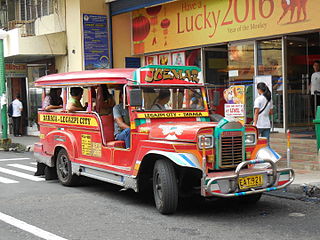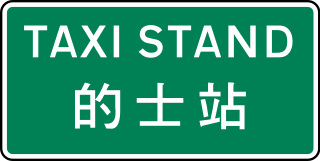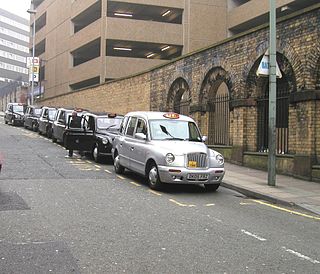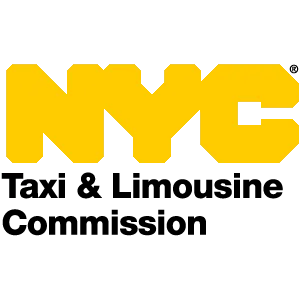Related Research Articles

A hackney or hackney carriage is a carriage or car for hire. A hackney of a more expensive or high class was called a remise. A symbol of London and Britain, the black taxi is a common sight on the streets of London. The hackney carriages carry a roof sign TAXI that can be illuminated to indicate their availability for passengers.

A taximeter or fare meter is a mechanical or electronic device installed in taxicabs and auto rickshaws that calculates passenger fares based on a combination of distance travelled and waiting time. Its shortened form, "taxi", is also a metonym for the hired cars that use them.

A share taxi is a mode of transport which falls between a taxicab and a bus. These vehicles for hire are typically smaller than buses and usually take passengers on a fixed or semi-fixed route without timetables, but instead departing when all seats are filled. They may stop anywhere to pick up or drop off their passengers. Often found in developing countries, the vehicles used as share taxis range from four-seat cars to minibuses. They are often owner-operated.

Checker Motors Corporation was a Kalamazoo, Michigan, vehicle manufacturer and tier-one subcontractor that manufactured taxicabs used by Checker Taxi. Morris Markin established the company in 1922, initially named the Checker Cab Manufacturing Company, in Chicago through a merger of Commonwealth Motors and Markin Automobile Body. The manufacturer moved to Kalamazoo in 1923 and was renamed to Checker Motors in 1958.

Hong Kong taxicabs are the principal taxi service in Hong Kong. Although a few taxis are independently owned and operated, the vast majority are owned by 17 independent taxi companies that rent out taxis on a shift basis to 40,000 self-employed drivers.

In New York City, taxicabs come in two varieties: yellow and green; they are widely recognizable symbols of the city. Taxis painted yellow are able to pick up passengers anywhere in the five boroughs. Those painted apple green, which began to appear in August 2013, are allowed to pick up passengers in Upper Manhattan, the Bronx, Brooklyn, Queens, and Staten Island. Both types have the same fare structure. Taxicabs are operated by private companies and licensed by the New York City Taxi and Limousine Commission (TLC). It also oversees over 40,000 other for-hire vehicles, including "black cars", commuter vans, and ambulettes.

Taxis of Singapore come in two main varieties. Traditional taxi companies offer flag down and call bookings and their drivers are hired employees of the company. Ridesharing companies allow bookings through a smartphone, allowing ease for passengers, these are mostly known as private hire vehicles (PHV). Their apps also allow the flexibility to work and pick up passengers with their own vehicle, be it owned or rented, provided the various requirements are met depending on the company.

A motorcycle taxi, or cart bike or bike taxi, is a licensed form of transport in some countries. The taxi typically carries one passenger, who "rides pillion" behind the motorcycle operator. Multiple passengers are common in some countries.
Taxicabs within a country often share common properties, but there is a wide variation from country to country in the vehicles used, the circumstances under which they may be hired and the regulatory regime to which these are subject.
The taxicabs of the United States make up a mature system; most U.S. cities have a licensing scheme which restricts the number of taxicabs allowed. As of 2012 the total number of taxi cab drivers in the United States is 233,900; the average annual salary of a taxi cab driver is $22,820 and the expected percent job increase over the next 10 years is 16%.

Taxicabs are regulated throughout the United Kingdom, but the regulation of taxicabs in London is especially rigorous with regard to mechanical integrity and driver knowledge. An official report observed that: "Little however is known about the regulation by anyone outside the trade. The Public Carriage Office (PCO), which regulates and licenses taxis and private hire was transferred from the Metropolitan Police to become part of Transport for London in 2000." In 2015, there were around 298,000 licensed drivers in England, of which 164,000 were private hire licences, 62,000 were taxi licences and 72,000 were dual licences.
The Cabcharge account payment system was established in 1976 to provide taxi passengers a way to pay for taxi fares by non-cash means. The payment system is owned and operated by A2B Australia, an Australian Securities Exchange listed public company. In the UK and Singapore, Cabcharge is operated by subsidiaries of ComfortDelGro.

Taxis in Australia are highly regulated by each Australian state and territory, with each state and territory having its own history and structure. In December 2014, there were 21,344 taxis in Australia. Taxis in Australia are required to be licensed and are typically required to operate and charge on a fitted taximeter. Taxi fare rates are set by State or Territory governments. A vehicle without a meter is generally not considered to be a taxi, and may be described, for example, as a hire car, limousine, carpool, etc. Most taxis today are fueled by liquid petroleum gas. A2B Australia owns and operates the Cabcharge payment system, which covers 98% of taxis in Australia, and operates one of Australia's largest taxi networks.

The New York City Taxi and Limousine Commission is an agency of the New York City government that licenses and regulates the medallion taxis and for-hire vehicle industries, including app-based companies such as Uber and Lyft. The TLC's regulatory landscape includes medallion (yellow) taxicabs, green or Boro taxicabs, black cars, community-based livery cars, commuter vans, paratransit vehicles (ambulettes), and some luxury limousines.
Illegal taxicabs, sometimes known as pirate taxis, gypsy cabs, or jitney cabs, are taxicabs and other for-hire vehicles that are not duly licensed or permitted by the jurisdiction in which they operate. Most major cities worldwide require taxicabs to be licensed, safety-inspected, insured as for-hire vehicles, and to use taximeters, and there may also be requirements that the taxi driver be registered or accredited. However, many unlicensed cabs are in operation. Illegal cabs may be marked taxi vehicles, and others are personal vehicles used by an individual to offer unauthorized taxi-like services. Illegal cabs are prevalent in cities with medallion systems, which restrict the number of legal cabs in operation. Since their introduction in 2009, vehicles affiliated with the transportation network company Uber have been classified as illegal taxicabs in some jurisdictions.

A taxi, also known as a taxicab or simply a cab, is a type of vehicle for hire with a driver, used by a single passenger or small group of passengers, often for a non-shared ride. A taxicab conveys passengers between locations of their choice. This differs from public transport where the pick-up and drop-off locations are decided by the service provider, not by the customers, although demand responsive transport and share taxis provide a hybrid bus/taxi mode.
Taxicabs and other vehicles-for-hire in Canada are regulated by local municipalities and provinces, and are owned & operated by private companies and individuals. Unlicensed cabs in some cities are referred to as bandit taxis/cabs.

Cars such as Toyota Etios, Maruti Omni, Mahindra Logan, Maruti Suzuki, Tata Indica and Tata Indigo are fairly popular among taxicab operators. The livery of the taxicabs in India varies from state to state. In Delhi and Maharashtra, most taxicabs have yellow-black livery, while in West Bengal, taxis have yellow livery. Private taxicab operators are not required to have a specific livery. However, they are required by law to be registered as commercial vehicles.

Mercedes-Benz is a popular brand of taxi in numerous countries worldwide. Some countries, such as Morocco, imported thousands of Mercedes-Benz taxi vehicles during the 1990s and as many as 55,000 were known to still be in use as of 2014. Mercedes offers specially configured vehicles designed for use as taxis as new from the factory.